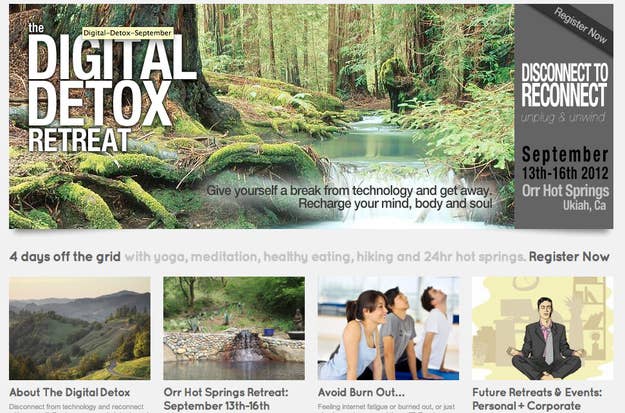
If you're a human lucky enough to have access to smartphones and laptops, you may have a problem. Maybe it's a fear of being without your phone. Or a dopamine "addiction." Not to mention that the average American child spends more time with screens than any activity besides sleeping.
Not surprisingly, a nation of tech addicts has created a niche market: digital vacations. Luxury hotels in the Cayman Islands, British Columbia and Hawaii offer fancy packages for those looking to unplug. Even urban hotels will take your smart phone away for digital liberation. (Although freedom isn't free: as this good round-up of wire-less vacation options notes, these vacations spots can run as much as $4,000 a day.)
It is more than a little pathetic that one needs to have a device literally removed from one's person to stop constant communication, but that's where we seem to be. One of the most thoughtful approaches to helping people go offline comes from — where else — the Bay Area and its founder is a former tech junkie himself. Levi Felix was a part of the team working on a non-profit start-up, CauseCast in Los Angeles in 2009, when, while on the way to the airport to attend SXSW, he found himself laid low by stomach pain. He took a detour to go to the hospital for what he thought would be a quick IV to replenish his fluids ("I pushed myself really hard") when he got the bad news. Doctors told him that he'd have to be in the hospital for a few days —he had a serious ulcer.
"They said it was too much stress, cigarettes, coffee and spicy Thai food, which was pretty much my entire diet, " said Felix, "After that, I thought, is it worth spending 80 hours a week at work?"
Felix and his girlfriend-slash-business partner took off after that to travel, eventually running a guesthouse in a remote island off Cambodia. When they got back to the U.S. last year, they found that the speed and connectivity of modern tech was even more intense than when they left — with more talk of the problems with being online than solutions. So they launched a website, The Digital Detox, and began planning monthly off-the-grid weekends for around a dozen paying guests at a time. They also hold regular dinners at their house — check your cell phones at the door, please — host weekly meet-ups at a local farmer's market, curate analog-only spaces at conferences and parties, and give talks to start-ups about how to achieve digital balance.
"Everyone is a techie these days, everyone is using their cell phone as their alarm clock," he said, "By default, everyone is invested in this movement."

So how does Felix aim to get people into harmony with their screens? First of all, Digital Detox attendees check all devices at the door —phones, laptops, even watches. Before they arrive, Felix provides instructions for how to tell friends, family and colleagues that you'll be unavailable for at least three days. Seems sad that so much planning has to go into such a short vacation, but Felix claims that it is necessary. "When people go on vacation and have the intention of unplugging, studies show that they spend 30% of the time working or on some kind of tech anyways," he said. Even when there is no reception, like the Northern California hot springs where the September workshop will be taking place, "people find themselves going on a camping trip, grabbing their phone and going on old emails."
Once devices have been surrendered, Felix begins a series of activities such as two-hour yoga sessions in the mornings to fill time with analog activities — "it's analogous to a computer, you have to let your whole body reboot." Journaling becomes a big deal when people are deprived of the ability to take pictures and all talk of work is forbidden. The final day of the retreat is devoted to helping people "re-integrate" into tech-filled world.
"You're going to want to Instagram your meal," said Felix, without a hint of sarcasm, "So I tell people, you pull out your journal and write instead.'" Resistance is futile: "by day two, it's hard to peel people away from their journals."
Has anyone cheated? "No," he said, "The closest was before someone turned in their cellphone, they snapped pictures of the yurt they'd be staying in."

It's obviously a self-selected group that would pay up to $900 to wake up every morning with a bell and be told not to discuss work at dinner. The attendees are heavy in the tech industry — testimonials from a Google employee, a director of marketing at Tom's shoes and multiple "digital strategists" dot the detox website. No one has yet been sent on Digital Detox as an actual intervention, although it could happen.
"We had one attendee who had just gotten out of a relationship because of his problems with technology. He was dealing with this and said, 'I do have a problem.' It was his inability to say no. If someone texted him or sent him a Facebook message, he wasn't able to not look at the phone, to say 'I'll get that later.'"
Felix claimed to be friendly toward technology, though it was hard not to hear the judgment creep in. The people who are too busy for his retreat? Well, Felix said, they are the ones need it the most. As Alexis Madrigal pointed out in a recent Atlantic post, blaming the device ignores the issue of labor in the 21st century — he likened it to 19th century workers fixating on the clock as the reason for their long workdays. I protested to Felix that not everyone who interacts heavily with these devices has a problem with the device per se — personally, I think I would be addicted to stone tablets if that were the communication device of my time — and Felix agreed. But while my path to mindfulness might not involve having someone ring a bell in my ear as a wake-up call and talking about "dreams and passions" over dinner (as Felix said his attendees were wont to do), it was hard to argue that people shouldn't limit their screen time. If you get better with nature walks and hugs, well, so be it.
Ironically, Felix's business has been keeping him online quite a bit lately. He's done zero traditional marketing — it's all been word of mouth, digital and otherwise — and he arranges payment through PayPal. Generally, he says that he spends five to six hours online daily. Which is not ideal,, but he completely unplugs at least one day a week. Or, at least, he tries to. "We're not Luddites, we love technology. I can rant about the potentials of nanotechnology and I'm a fan of Ray Kurzweil," he said. "But it's about us being the owners of tech, not the slaves."

Bonus: Rules for Online/Offline Living.
How does Felix himself deal with the modern world? Over email, he shared these details on his life.
I typically set certain times of the day for doing different tasks or activities like using Facebook, checking emails, reading, etc. If someone sends me a link to an article or I come across a video that seems interesting, I try and put them aside as a bookmark or in a folder to go through later at a specific part of my day — so I can stay focused and not get sucked into the never ending information portal that is the internet (which is amazing and fun, but can become a total time suck). I check my emails in batches and share content in the same way. By segmenting my day, I am better able to manage my time online and be more efficient.
Limits:
- I do not use technology or consume online media while I eat (during meals)
- I don't pull out my smart phone in the middle of conversation, unless it's critical to the conversation
- I do not bring technology into the bedroom or bathroom (critical)
- I do not get notifications on my smart phone from Facebook, Emails, etc. (I choose when I want to check my messages and am intentional about it).
- I utilize an alarm clock instead of my smart phone (this is very important, as my emails/notifications/etc are not the first thing I see in the morning).
- Before I get online in the morning I like to wake up, meditate or sit for a bit, have my tea, spend time with my partner and set my intention for the day.
- I tell people that if it is an emergency, critical or if they just want to get ahold of me that calling me is the best way.
- I try and call people directly, instead of spending tons of time going back and forth via email to setup a call. Sometimes just picking up the phone can cut out a lot of unnecessary time spent online in the inbox.
- I minimize "working out of the inbox"
- At a certain part of the day, I just put my phone and computer away, and call it a day.
